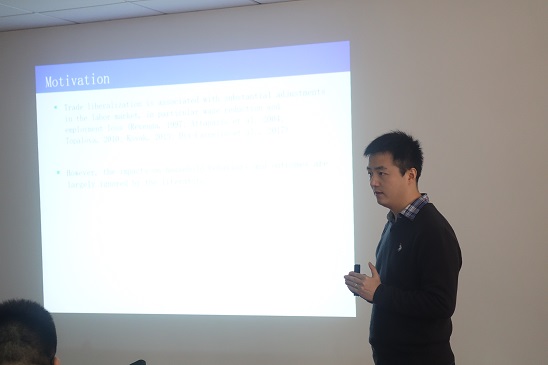In the morning of December 11th 10AM, Weiyu building room 117, Dr. Huang Wei assistant professor of the strategy and policy of President from National University of Singapore Department of real estate delivered a speech for IEF teachers and students, entitled " How Do Households Adjust to Trade Liberalization? Evidence from China’s WTO Accession ". Dr. Huang, a doctor of economics of Harvard University, has been teaching and communicating with the audience from time to time. The lecture has been carried out splendidly.
First, Dr. Huang explained that the research on the impact of China's accession to the WTO is limited to the enterprise level, and the study of the impact of WTO on individuals is still lacking. So it is important to be committed to the impact of entry into the family, including work, consumption and so on. One of the major commitments of China's accession to the WTO agreement is to reduce tariffs, so the tax relief of imported goods will impact domestic enterprises. Then, he enumerated the focus of the study, mainly including three aspects, the supply of labor, the structure of the family and the income and expenditure of the family. Afterwards, he described the construction of the econometric model, controlled variables such as city and environment, and illustrated the impact of tariff reduction on variables such as labor market and family behavior. Through the econometric method, the results show that the evidence of a single labor family turning into a double labor family and the aging of labor force has a certain relationship with China's entry into the WTO. In addition, in the face of income shocks, family members, especially in non-tradeble sectors, tend to work more time. More and more young people cohabitation with the elderly makes the family structure expand to reduce the cost of living.
The students and teachers are deeply attracted by the topic and have raised questions for discussion such as whether the target audience is all urban residents. Dr. Huang responds positively to the question, where residents refer to resident urban residents, excluding outsiders and non-residents. Dr. Yin in our college also raises the question that the progress of IT technology in South Korea will lead to a drop in wage income and a decrease in staff requirements in 2001. Dr. Huang believes this issue is worth considering.
Through this lecture, teachers and students have a better understanding of the impact of the WTO on individuals and meanwhile open us up to new ideas. The lecture provided by Dr. Huang is full of logic and detailed data to explain to the teacher and inspires us a lot.

